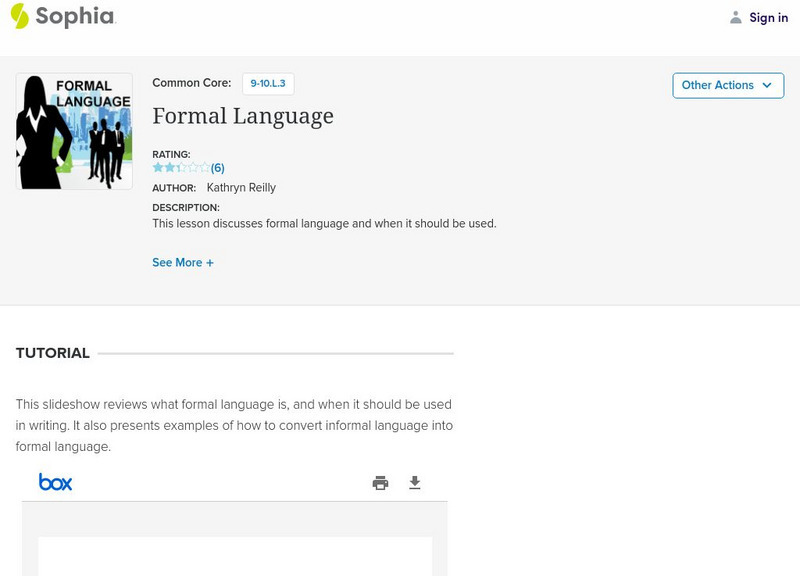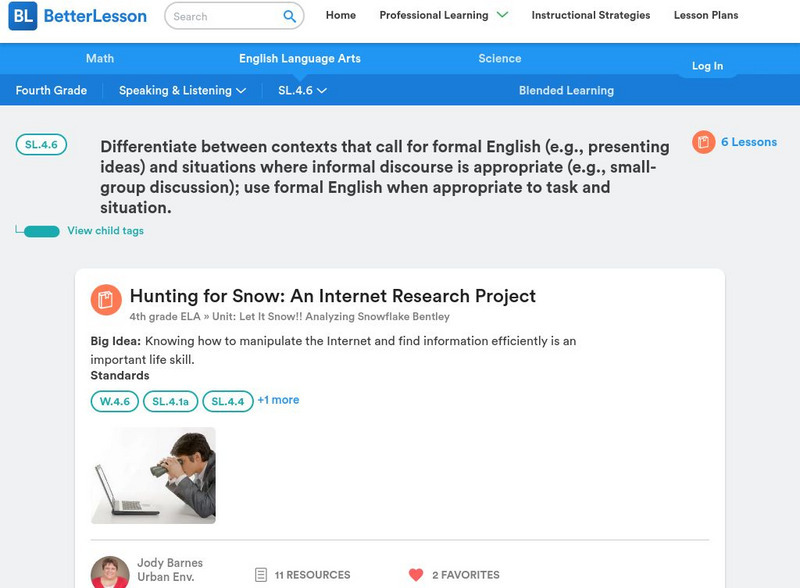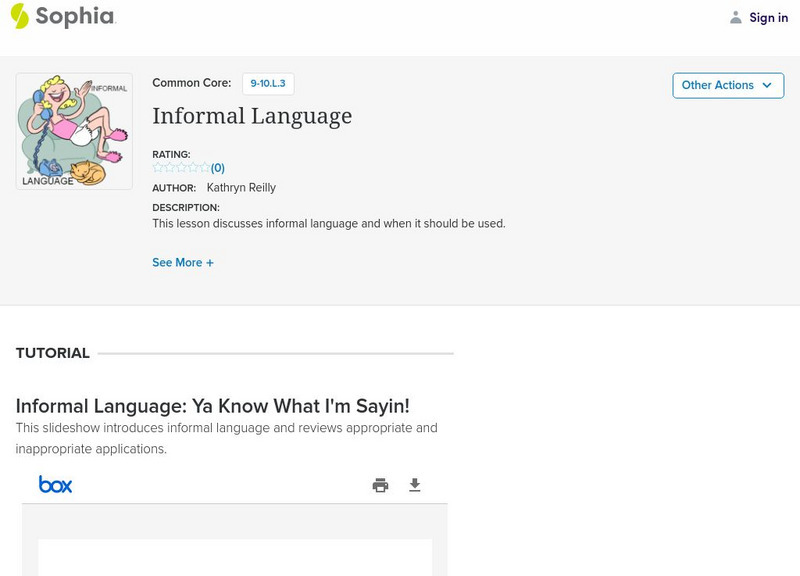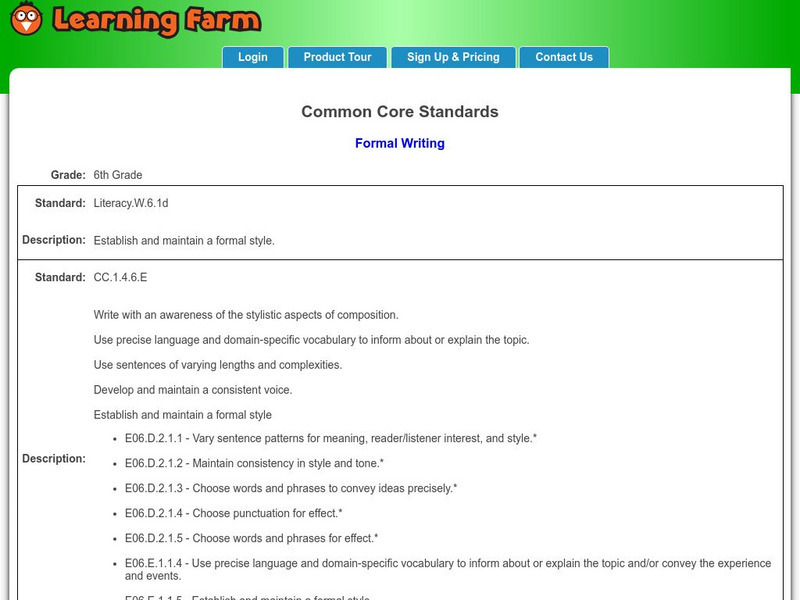Hi, what do you want to do?
Curated OER
Quebec
Ninth graders to examine the past to find out why Quebec has been so determined to protect its cultural heritage. They access primary resources on the Internet to promote their engagement with the past.
Curated OER
Investigation of Pot Sherds
Fourth graders review their prior knowledge on the concept of pi. Using broken pieces of pottery, they calculate the circumference from a section of the circle. In teams, they compete against one another to get the most accurate...
Other
Pitner's Potpourri: Formal and Informal Language
A Common Core teacher resource provides an approach to educating students on the differences between formal and informal language.
BBC
Bbc: Skillswise: Speaking and Listening: Formal and Informal Speaking
This Skillswise site focuses on formal and informal speaking. Included are a video about how to decide whether to use formal or informal speech, fact sheets and worksheets for instruction. The Skillswise sites from BBC are geared to...
BBC
Bbc: Skillswise: English: Formal and Informal Speaking Quiz [Pdf]
Assess the differences between formal and informal speech. Three levels of difficulty with answers provided.
Other
Match the Memory: Formal vs Informal Language
Match the Memory Interactive game where players match a word to either formal or informal language.
CPALMS
Cpalms: The Lesson Formerly Known as "Wassssuuup"
[Free Registration/Login Required] In this lesson, students are actively engaged in learning how formal and informal language are used in written and oral communications. Downloadable handouts are provided.
Online Writing Lab at Purdue University
Purdue University Owl: Academic Writing: Levels of Formality
Basic information explaining how the context, i.e., the audience and your purpose, determines whether you should use formal, semi-formal, or informal language. The links on the sidebar provide much more information about formal academic...
Department of Defense
Do Dea: Conventions
Sharpen your use of the formal conventions of English with this self-guided learning module. The module focuses on formal and informal language, making pronouns agree with their antecedents, and common spelling and grammar errors. At the...
Sophia Learning
Sophia: Formal Language
This slideshow lesson focuses on formal language. It reviews the basics of formal language and the need to know your audience. It explains how to change various types of informal language into formal language and provides examples....
BBC
Bbc Bitesize: Speaking and Listening: Standard English
Explains what standard English is and when it is used, the difference between formal and informal language, and non-standard forms of English such as those found in dialects.
Better Lesson
Better Lesson: Sl.4.6: Differentiate Between Formal and Informal English Contexts
Links to 6 lessons and activities that build student skills in standard SL.4.6: Differentiate between contexts that call for formal English (e.g., presenting ideas) and situations where informal discourse is appropriate (e.g., small...
Better Lesson
Better Lesson: Audience, Tone, and Style in Informative Text
Students will read samples of informative writing and highlight examples of how tone and style are used by the authors. Students will then apply this knowledge by writing their own informative text. Multiple examples of student work and...
Sophia Learning
Sophia: Informal Language
This lesson discusses informal language and when it should be used. SL.9-10.6 Adapt to task/formal
Online Writing Lab at Purdue University
Purdue University Owl: Using Appropriate Language
Knowing the right language for your particular audience is a necessary skill for all writers. No one wants to offend their audience or appear as though they don't know their content. Learn these rules of thumb to become more familiar...
TES Global
Tes: Letters: Formal & Informal
[Free Registration/Login Required] This resource provides explanations for different modes of writing. Examples of informal and formats are provided.
Learning Farm
Learning Farm: Common Core Standards: Formal Writing
Writing formally means writing using words that are precise, objective, and impersonal. This lesson gives examples of formal language and also provides games and a test. CCSS.ELA-Literacy.WHST.6-8.2.e
Grammarly
Grammarly Blog: Anyway, Anyways, or Any Way
This page focuses on formal and informal use of "anyway," anyways," and "any way." Anyways is very infomal and should not be used; "anyway" is correct to mean "in case of" and "any way" should be used for all other situations. Examples...
English Worksheets Land
English Worksheets Land: Informal vs. Formal Uses of English Worksheets
Language is seen as coming in two basic forms - formal and informal. These worksheets will help students identify the different uses of language.
Sophia Learning
Sophia: Appropriate Language
This lesson focuses on using appropriate language in formal writing; it discusses pretentious language, jargon, and cliches. It defines each, provides examples, and explains why and how to avoid each. SL.9-10.6 Adapt to task/formal
Grammarly
Grammarly Handbook: Cliches
This page focuse on cliches and explains why they should not be used in formal writing; it provides examples of other words to get the point across more clearly.
Grammarly
Grammarly Handbook: Informalities
A list of style techniques (with examples) used to create an informal tone in a written piece.
TES Global
Tes: Romeo and Juliet: Prologue Introduction Resource
[Free Registration/Login Required] This downloadable activity is designed for the Prologue to William Shakespeare's Romeo and Juliet. Students will match quotes from the Prologue to sentences that are less formal. Students will also...
Sophia Learning
Sophia: Grammar and Formality
This lesson goes over ways in which the correct use of grammar may be perceived as formality. CCSS.ELA-Literacy.CCRA.L.1 and CCSS.ELA-Literacy.CCRA.SL.6, L.11-12.1a Gram/Usage changes









![Bbc: Skillswise: English: Formal and Informal Speaking Quiz [Pdf] Unknown Type Bbc: Skillswise: English: Formal and Informal Speaking Quiz [Pdf] Unknown Type](http://lessonplanet.com/content/resources/thumbnails/411268/large/bwluav9tywdpy2symdiwmduymc0ymtiwny1jegxunwmuanbn.jpg?1589993555)
















